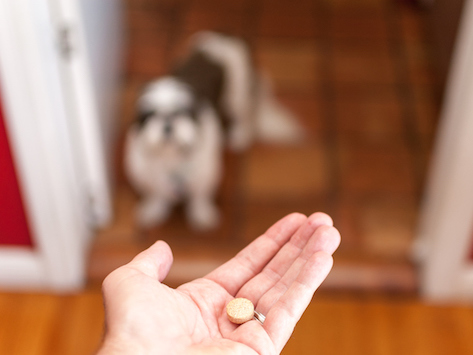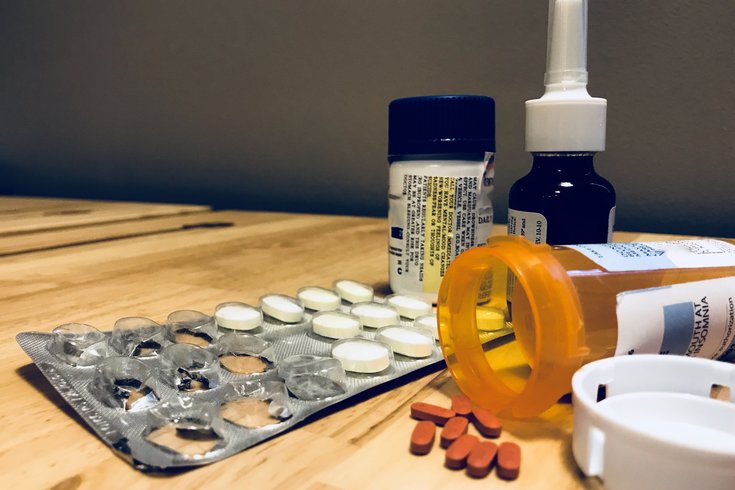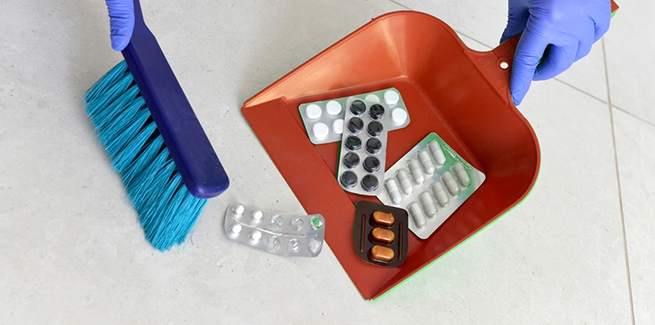
If you’re like most pet owners, you probably have a drawer or cabinet full of “stuff” for your pet. The collection might include old collars, broken toys you haven’t gotten around to repairing, treats your pet didn’t like and other miscellaneous bits you’ve collected over time. You might even have some old unused pet medications in that assortment. Maybe you’ve held onto those medicines because you’re not sure what else to do with them, or if they could be needed in the future.
Here’s what you need to know about unused pet medication.
Leftover Pet Medication Should Be Rare
Ideally, you shouldn’t have any medication left over after treating your pet for a medical condition. In most cases, your veterinarian will prescribe the correct amount of medication for the treatment and will want you to give the entire course of medication to your pet. You shouldn’t stop giving your pet the medication when they seem to be feeling better unless that’s the direction given to you by your vet.
In some cases, your vet will provide you with more medication than needed because your pet’s condition improved more quickly than expected. Or maybe a certain course of treatment wasn’t working, so your vet recommended a new approach before all the medication was finished from the first treatment. When that happens, you’ll need to know how to safely dispose of your unused pet medication.
Risks of Keeping Unused Medication

Just like with human medications, keeping old or unused pet medications around the house can present risks to both humans and pets in the household.
Expired medications
Using expired medications can be risky. Expired medications may not be as effective at treating conditions as their non-expired counterparts. While this might not matter as much for less-serious conditions, taking expired medication for life-threatening conditions such as a heart condition or diabetes can pose a serious risk to your pet’s health. In addition to being less potent, some medications decay and could actually pose a serious health danger if used past their expiration dates.
Improper diagnosis
If your pet is presenting symptoms that appear similar to a past illness that was treated with a medication you still have, it can be tempting to attempt to treat the condition with the old medication. That can be very dangerous, as many illnesses present with similar symptoms to someone without a veterinary background. Your pet could have a completely different issue that, at best, won’t respond to the old treatment. At worst, you could cause your pet serious harm by offering improper medication. Your pet should be seen by a veterinarian before being given any medication, even if you believe you know what the issue is.
Household hazard
According to the CDC, about 600,000 kids end up in emergency rooms every year because they get into medications being stored in the home. And it’s not only prescriptions or over-the-counter medications meant for humans that can be dangerous. Pet medications can pose just as much of a threat as human prescriptions to kids who find them in the home. That’s one more reason why properly disposing of any unused medication is the safest option.
Risks of Improper Disposal

Now that you’re ready to dispose of any unused or expired pet medication, what’s the best way to get rid of it? First of all, let’s go over the things you should NOT do to dispose of unused pet medications.
Trash
Unused medications can be thrown away, but it’s best not to simply dispose of them by throwing them away in the original bottle or package. They could be found in the trash and pose a hazard to children, pets, or other animals.
Sewer
While many over the counter medications can be disposed of by flushing them down the toilet or washing them down the sink, that is considered to be an environmentally unfriendly way to dispose of medication, since the medication ends up in the water supply. As such, we do not recommend this method of disposal.
Give Away
Unused and expired medications would present the same risks to the pets of friends or family members as they present to your own animals. You shouldn’t give unused pet medications to other people simply to get them out of your home. Choose one of the disposal methods below for the safest way to dispose of unused pet medications.
Ways to Dispose of Unused Pet Medication

If you have unused pet medications taking up room in your home, there are several safe and easy ways you can dispose of the medications.
Return Unused Pet Medication to the Vet
Having a pet with a serious illness can be a very expensive proposition. Many vets will offer donated medication to clients faced with a large bill to help alleviate some of the costs related to caring for a sick pet. In addition, a vet will know which medications can be safely passed on to other pets and which need to be disposed of. If your vet offers this option, it’s a great way to help other pets and their owners when times are tough.
Donate Unused Pet Medication to a Local Animal Shelter
Most animal shelters are non-profit organizations and rely on donations of all kinds to keep their doors open and to keep helping animals in need. In addition to monetary donations, volunteers who give their time and donations of food and toys, donations of unused medication can be very helpful to a shelter. Medications for common ailments like heartworms or flea and tick treatments are just as valuable as medications for other illnesses. Most shelters will be grateful for any donation you can give. Before donating unused pet medications to an animal shelter, you should make sure the shelter has a veterinarian on-staff to ensure the medications are properly used.
Throw Away Unused Pet Medication
If you don’t want to donate your unused pet medication, the best way to dispose of it in the trash is to remove it from the original packaging and mix it with something unappetizing in the trash, such as coffee grounds or used cat litter. Then seal everything up in another container and place that container in the trash as close to your garbage pickup time as possible. These steps are meant to help to stop the medication from being found and misused, though this solution isn’t completely foolproof.
Dealing with unused pet medication is much like handling used prescription medications meant for humans. Their disposal should be handled carefully and thoughtfully to avoid any potential hazards to people or pets. If you can, donating unused pet medication is always the preferred solution, since it helps animals in need while keeping the medications out of the landfill.


